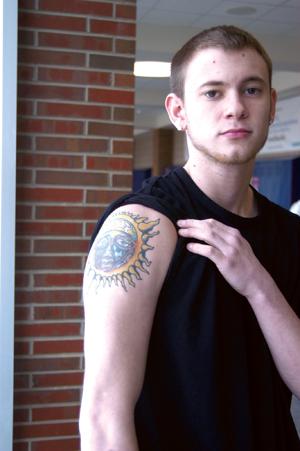 By Renny Logan
By Renny Logan
[email protected]>
Senior Jacob “Jake” Landis got his first tattoo when he turned 17. The tattoo, directly over his right shoulder, depicts the band Sublime’s logo of a sun. “I’d been saying I wanted the same tattoo for probably about a year and it just hadn’t changed,” Landis said. Finally, his parents caved in and gave their perm
ission, which state law requires. “I’ve always wanted to get (a tattoo),” Landis said. “It’s a good way to express yourself artistically in an unconventional way.”Over the years, tattoos have become more socially accepted as a form of self-expression. Similarly, the number of underage individuals like Landis who want body art has increased. One thing sets Landis apart, however; he got the tattoo with his parents’ permission. According to Senate Bill No. 13, passed in 1997, Indiana law states that criminal penalties will be enforced on any tattoo artist that “provides tattoos to persons less than 18 years.” However, the bill further states that a minor may receive a tattoo if a parent or guardian is present and submits written consent.
But even with parent permission, selecting a tattoo parlor goes beyond that of the individual who wants a tattoo. Certain tattoo parlors will refuse the work regardless, tattoo artist Wes McIlvain said. “Any reputable place isn’t going to put themselves morally out.” When approached with such a situation, McIlvain said he uses discretion. “(Tattoo artists) do kind of have to pick and choose and it’s kind of mean and people don’t like it, but that’s part of the tattoo shop.” After all, McIlvain said, tattooing involves risks that many people, especially minors, don’t consider. Selecting the right parlor goes beyond sanitation and cleanliness, McIlvain said, saying that tattooing involves much more than drawing on skin with a needle. “People think (tattooing) is really simple. It’s hard to get (the needle) in there efficiently without shredding the skin up,” McIlvain said.
Often, minors opt for second-rate shops or private homes in attempts to avoid tattoo laws, which can lead to not only injury and infection but dissatisfaction with the finished product as well. But with 15 years of the industry under his belt, McIlvain has perfected a technique all his own and said the difference between a good tattoo artist and a bad one comes down to small details. These details greatly affect the work that is done, McIlvain said. “I still, by hand, groove and solder all my own needles,” he said. “People buy (needles) pre-made now with no thought of how they’re made, and without that knowledge, you lose a little bit of understanding of how it works.” Little things like how the needles are made can make all the difference when it comes to selecting a tattoo shop, McIlvain said, and minors looking for tattoos will most likely stumble on the second-rate ones. McIlvain, who got his first tattoo at age 14, said, “(Parents) better inform (minors) before they (get a tattoo) themselves. And a lot of them do. In a situation where they’re underage or they want that tattoo, they’re probably gonna find it somewhere, and they don’t care (if the shop is reputable). I know out of my own personal experience. I’m glad I did, but in hindsight, boy it was stupid.”
McIlvain said that, among other things, the age restriction on tattoos helps to prevent poor choices that will leave a permanent mark that will remain with that person for the rest of his or her life. “I don’t want to be the one that put ‘thug-life’ on some 17-year-old’s stomach,” he said. “The kid turns 25 and thinks ‘Jesus, I’m stuck with “thug-life” on me.’”
Landis said not only did he have parent permission for his tattoo but that also he put a lot of thought into his choice. He points out that the logo not only represents one of his favorite bands but also that the art itself had significance to him. He said he had no set amount of time as a “waiting period” to decide on his tattoos, but said he that he thinks constantly about the tattoos he has planned out. McIlvain said that the age restriction does aid in preventing minors from making split-second decisions on tattoos, but also said mistakes, as far as tattoo choices, can occur at any age. “I have tattoos from when I was 23 that I regret,” he said. “The simple fact is that (tattoos) are gonna be with you forever.”




























![Keep the New Gloves: Fighter Safety Is Non-Negotiable [opinion]](https://hilite.org/wp-content/uploads/2024/12/ufcglovescolumncover-1200x471.png)















































![Review: “We Live in Time” leaves you wanting more [MUSE]](https://hilite.org/wp-content/uploads/2024/12/IMG_6358.jpg)
![Review: The premise of "Culinary Class Wars" is refreshingly unique and deserving of more attention [MUSE]](https://hilite.org/wp-content/uploads/2024/12/MUSE-class-wars-cover-2.png)
![Introducing: "The Muses Who Stole Christmas," a collection of reviews for you to follow through winter [MUSE]](https://hilite.org/wp-content/uploads/2024/12/winter-muse-4.gif)
![Review: "Meet Me Next Christmas" is a cheesy and predictable watch, but it was worth every minute [MUSE]](https://hilite.org/wp-content/uploads/2024/11/AAAAQVfRG2gwEuLhXTGm3856HuX2MTNs31Ok7fGgIVCoZbyeugVs1F4DZs-DgP0XadTDrnXHlbQo4DerjRXand9H1JKPM06cENmLl2RsINud2DMqIHzpXFS2n4zOkL3dr5m5i0nIVb3Cu3ataT_W2zGeDAJNd_E-1200x884.jpg)
![Review: "Gilmore Girls", the perfect fall show [MUSE]](https://hilite.org/wp-content/uploads/2024/11/gilmore-girls.png)
![Review in Print: Maripaz Villar brings a delightfully unique style to the world of WEBTOON [MUSE]](https://hilite.org/wp-content/uploads/2023/12/maripazcover-1200x960.jpg)
![Review: “The Sword of Kaigen” is a masterpiece [MUSE]](https://hilite.org/wp-content/uploads/2023/11/Screenshot-2023-11-26-201051.png)
![Review: Gateron Oil Kings, great linear switches, okay price [MUSE]](https://hilite.org/wp-content/uploads/2023/11/Screenshot-2023-11-26-200553.png)
![Review: “A Haunting in Venice” is a significant improvement from other Agatha Christie adaptations [MUSE]](https://hilite.org/wp-content/uploads/2023/11/e7ee2938a6d422669771bce6d8088521.jpg)
![Review: A Thanksgiving story from elementary school, still just as interesting [MUSE]](https://hilite.org/wp-content/uploads/2023/11/Screenshot-2023-11-26-195514-987x1200.png)
![Review: "When I Fly Towards You", cute, uplifting youth drama [MUSE]](https://hilite.org/wp-content/uploads/2023/09/When-I-Fly-Towards-You-Chinese-drama.png)
![Postcards from Muse: Hawaii Travel Diary [MUSE]](https://hilite.org/wp-content/uploads/2023/09/My-project-1-1200x1200.jpg)
![Review: "Ladybug & Cat Noir: The Movie," departure from original show [MUSE]](https://hilite.org/wp-content/uploads/2023/09/Ladybug__Cat_Noir_-_The_Movie_poster.jpg)
![Review in Print: "Hidden Love" is the cute, uplifting drama everyone needs [MUSE]](https://hilite.org/wp-content/uploads/2023/09/hiddenlovecover-e1693597208225-1030x1200.png)
![Review in Print: "Heartstopper" is the heartwarming queer romance we all need [MUSE]](https://hilite.org/wp-content/uploads/2023/08/museheartstoppercover-1200x654.png)



